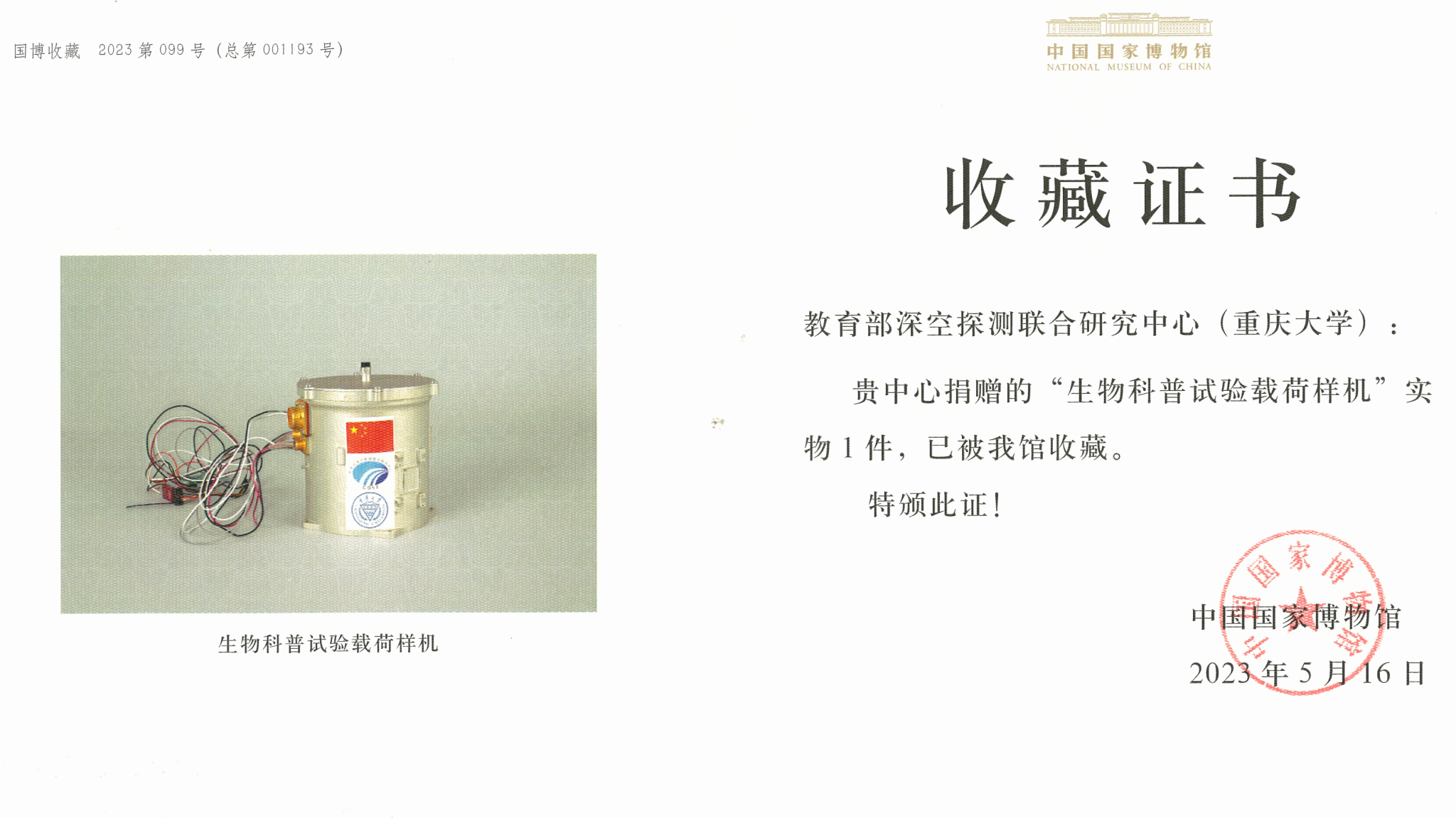In 2023, the National Museum of China officially listed Chongqing University's Chang'e-4 lunar mission-based biological experiment payload prototype (referred to as the "biological payload tin") in its collection [NMC Collection (No. 001193)], allowing it to be displayed to the public and open for visits.

In September 2022, the biological payload tin was exhibited at the Chongqing Module of the Achievement Exhibition themed on "Forging Ahead in the New Era" at the Beijing Exhibition Center. Through pictures, objects, videos and other forms, the payload presents how a small tin could have great wisdom. This "Chongqing-made tin" landed on the backside of the moon with the help of Chang'e-4 and delivered a historic "selfie," which recorded the first green leaf cultivated for the first time by human beings on the barren Moon. The biological payload tin was highly recognized by visitors when it was exhibited. It is of great significance that the National Museum of China has permanently collected the biological payload tin because of its contribution to the world's deep space exploration and scientific research by successfully carrying out the first biological experiment on the Moon. It is learned that previously the prototype of the biological payload and team members were invited to Macao, Spain, the United Kingdom, Sweden and other countries and regions for public exhibition, and received positive comments from the audience. Team members were also invited to Spain, France, Japan, Australia and other countries for exchanges, and conducted science popularization presentations for young people from 20 BRI partner countries through online and on-site invitations, which had a large international reach. Team members also delivered nearly 300 lectures and presentations on popularization of science in universities, middle schools, elementary schools, enterprises and communities across the country, published popular science books, conducted online talks, and produced videos on popularization of science. These efforts have directly benefited tens of millions of people, widely communicated the spirit of science and the achievements of China's aerospace industry, greatly inspired the young people to explore science, and enhanced the scientific literacy of the general public.
After the landing of the biological payload tin on the Moon three years ago, the team has actualized the first biological experiment carried out by human beings on the Moon, and successfully cultivated the first green leaf by human beings on the Moon. The team has achieved fruitful scientific research results, with 9 authorized invention patents (including 1 international patent) and the publication of monographs like Research on the Technology of Constructing Controlled Ecosystems in Human Extraterrestrial Space. The team has seized the rare opportunity to carry out research on the frost resistance of organisms in the low gravity environment of the Moon and the cultivation of organisms on extraterrestrial planets. The team has published 6 high-quality academic papers in Nature Communication, ACTA Astronautica, space science and technology and other prestigious journals at home and abroad, and for the first time put forward the proposal of utilizing the karst caves in Chongqing to carry out the simulation experiment of constructing a survival base for extraterrestrial planets based on the caves.
In the wake of its successful test, the biological payload of the Chang'e-4 lunar mission has garnered in-depth coverage and high praise from thousands of domestic and international media, including Xinhua News Agency, People's Daily, China Media Group, Science and Technology Daily, CNN, BBC, Nature, Science, etc. Among them, the international journals Science and Nature rated our achievement as "in first for mankind," and "the pioneering experiment," respectively. The team was awarded the "Outstanding Contributing Organization of Chang'e-4 Lunar Mission" and received the Chongqing Medal for Innovation and Excellence, meanwhile, Liu Hanlong, the chief commander of the project, and Xie Gengxin, the chief designer, were awarded the "Outstanding Contributing Individual of Chang'e-4 Lunar Mission."
